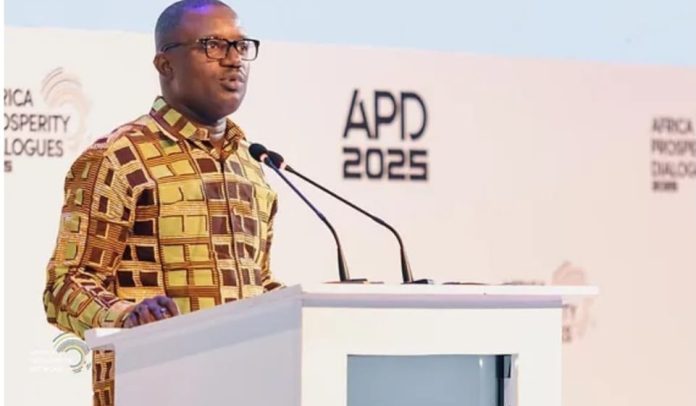John Jinapor
The Minister of Energy, John Abdulai Jinapor, says Ghana is committed to leading Africa’s energy transition aimed at advancing sustainable development in the sub-region.
Mr. Jinapor speaking at the Africa Prosperity Dialogues 2025 in Accra said Ghana is embarking on a progressive path towards ensuring that the country achieves renewable and sustainable energy for all countries in the sub-region.
“We are going to prioritize renewable energy as part of our energy transition by focusing on solar, wind, mini-hydro, waste-to-energy, and other renewable sources for the continent and Ghana in particular to meet its energy needs and requirements”.
The Minister said Ghana’s energy policy seeks to achieve an optimal energy mix that addresses both immediate and future needs with plans to accelerate renewable energy consumption.
That he explained would be achieved both on and off the grid, as well as promoting energy efficiency to reduce wastage and ensure that Ghana achieves overall benefits from the energy that it produces and consumes.
Mr. Jinapor also emphasised that given the requirement for a successful energy transition which particularly hinges on the availability of skilled labour and expertise, Ghana is prioritising the development of its human resources
through targeted training and providing the needed education to be able to achieve the objective of achieving the energy transition without serious challenges and risks.
He said access to capital remained one of the most significant obstacles to energy development across Africa.
The Minister stated that Ghana is therefore working towards prioritising self-funding, private sector involvement, and tapping into other green bonds and regional tech initiatives to address the challenge.
He also reiterated President Mahama’s commitment to establish a renewable energy investment and green transition fund at the just-ended Africa Energy Summit in Tanzania.
Mr. Jinapor said the fund, when established, will help mobilize domestic as well as international resources to pursue an aggressive agenda towards investment in renewable energies, particularly the upgrade of renewable energy.
“We seek to aggressively invest in home solar systems, wind, renewable streetlights, solar lamps, and clean cooking technologies to attain our vision towards ensuring that we promote renewable energy consumption in Ghana” he added.
He further stressed that while these strides were commendable, Africa’s energy future cannot be shaped by individual countries alone working in isolation but through collaboration.
“Energy is the lifeblood of Africa’s single markets, we need to collaborate and work together. Ghana believes in leveraging partnerships to tackle Africa’s fragmented energy landscape. We are determined to strengthen cross-border energy and infrastructure,” he added.
By Ebenezer K. Amponsah


